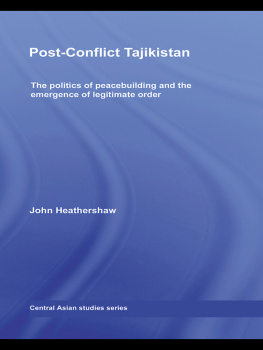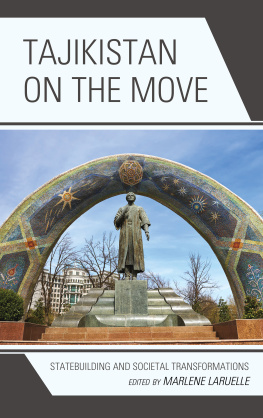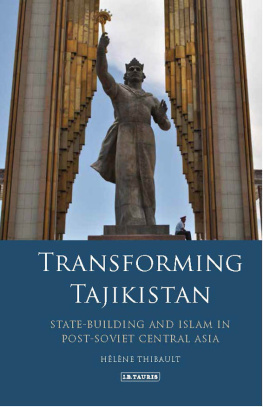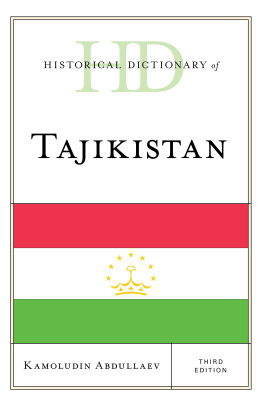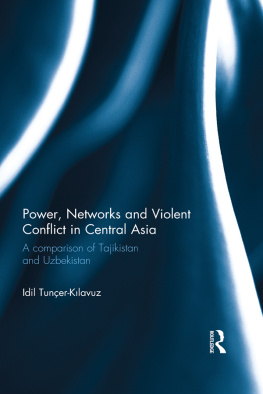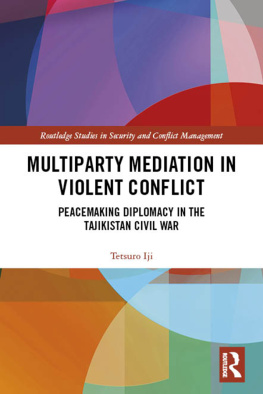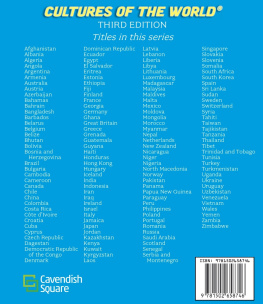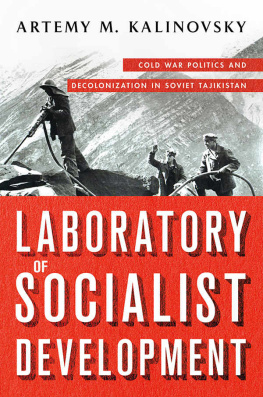The Transformation of Tajikistan
Tajikistan is one of the lesser-known and least-researched former Soviet Central Asian republics. The birth of the new state in 1991 was followed closely by a civil war which killed more than 50,000 people and displaced many tens of thousands more. While a peace agreement was signed in 1997, significant political violence continued until 2001 and intermittent outbreaks still occur today. Many claim it remains a very weak state and perhaps in danger of state failure or a return to civil war. However, the revival of Tajikistan should not simply be seen in terms of its post-conflict stabilization. Since its creation as a republic of the Soviet Union in 1920s, Tajikistan has been transformed from being a shell for socialist engineering to become a national society under a modern state. Despite a multitude of economic, social and political shocks, the Republic of Tajikistan endures.
This book places the transformation of Tajikistan in its Soviet and Post-Soviet historical settings and local and global contexts. It explores the sources of a state with Soviet roots but which has been radically transformed by independence and its exposure to global politics and economics. The authors address the sources of statehood in history, Islam and secularism, gender relations, the economy, international politics and security affairs.
This book is a new edition of a special issue of Central Asian Survey, Tajikistan: The Sources of Statehood, including two additional papers and a revised introduction.
John Heathershaw is Lecturer in International Relations at the University of Exeter. He is the author of Post-Conflict Tajikistan: The Politics of Peacebuilding and the Emergence of Legitimate Order.
Edmund Herzig is Soudavar Professor of Persian Studies and Fellow of Wadham College, University of Oxford.
Thirdworlds
Edited by Shahid Qadir, University of London
THIRDWORLDS will focus on the political economy, development and cultures of those parts of the world that have experienced the most political, social, and economic upheaval, and which have faced the greatest challenges of the postcolonial world under globalisation: poverty, displacement and diaspora, environmental degradation, human and civil rights abuses, war, hunger, and disease. THIRDWORLDS serves as a signifier of oppositional emerging economies and cultures ranging from Africa, Asia, Latin America, Middle East, and even those Souths within a larger perceived North, such as the U.S. South and Mediterranean Europe. The study of these otherwise disparate and discontinuous areas, known collectively as the Global South, demonstrates that as globalisation pervades the planet, the south, as a synonym for subalterity, also transcends geographical and ideological frontiers.
Terrorism and the Politics of Naming
Edited by Michael Bhatia
Reconstructing Post-Saddam Iraq
Edited by Sultan Barakat
From Nation-Building to State-Building
Edited by Mark T. Berger
Connecting Cultures
Edited by Emma Bainbridge
The Politics of Rights
Dilemmas for feminist praxis
Edited by Andrea Cornwall and Maxine Molyneux
The Long War Insurgency, Counterinsurgency and Collapsing States
Edited by Mark T. Berger and Douglas A. Borer
Market-led Agrarian Reform
Edited by Saturnino M. Borras, Jr.
After the Third World?
Edited by Mark T. Berger
Developmental and Cultural Nationalisms
Edited by Radhika Desai
Globalisation and Migration
New issues, new politics
Edited by Ronaldo Munck
Domestic and International Perspectives on Kyrgyzstans Tulip Revolution
Motives, mobilizations and meanings
Edited by Sarah Cummings
War and Revolution in the Caucasus
Georgia Ablaze
Edited by Stephen F. Jones
War, Peace and Progress in the 21stCentury
Development, Violence and Insecurities
Edited by Mark T. Berger and Heloise Weber
Renewing International Labour Studies
Edited by Marcus Taylor
Youth in the Former Soviet South
Everyday Lives between Experimentation and Regulation
Edited by Stefan B. Kirmse
Political Civility in the Middle East
Edited by Frdric Volpi
The Transformation of Tajikistan
Sources of Statehood
Edited by John Heathershaw and Edmund Herzig
Movement, Power and Place in Central Asia and Beyond
Contested Trajectories
Edited by Madeleine Reeves
Peoples Power and the Globalisation of Democracy
Edited by Barry K. Gills and Kevin Gray
First published 2013
by Routledge
2 Park Square, Milton Park, Abingdon, Oxon, OX14 4RN
Simultaneously published in the USA and Canada
by Routledge
711 Third Avenue, New York, NY 10017
Routledge is an imprint of the Taylor & Francis Group, an informa business
2013 Southseries Inc.
This book is based on the special issue of Central Asian Survey, vol. 30, issue 1. The Publisher requests to those authors who may be citing this book to state, also, the bibliographical details of the special issue on which the book was based.
All rights reserved. No part of this book may be reprinted or reproduced or utilised in any form or by any electronic, mechanical, or other means, now known or hereafter invented, including photocopying and recording, or in any information storage or retrieval system, without permission in writing from the publishers.
Trademark notice: Product or corporate names may be trademarks or registered trademarks, and are used only for identification and explanation without intent to infringe.
British Library Cataloguing in Publication Data
A catalogue record for this book is available from the British Library
ISBN13: 978-0-415-50015-9
Typeset in Times New Roman
by Saxon Graphics Ltd, Derby
Publishers Note
The publisher would like to make readers aware that the chapters in this book may be referred to as articles as they are identical to the articles published in the special issue. The publisher accepts responsibility for any inconsistencies that may have arisen in the course of preparing this volume for print.
Muriel A. Atkin , Elliott School of International Affairs, George Washington University, Washington, USA.
Filippo De Danieli , Independent scholar, London, UK.
Stephane A. Dudoignon , National Centre for Scientific Research (CNRS), Paris, France.
Tim Epkenhans , Department for Oriental Studies, Albrecht-Ludwigs-University Freiburg, Germany.
Olivier Ferrando , Institute of Political Studies (Sciences Po), Paris, France.
Colette Harris , School of International Development, University of East Anglia, Norwich, UK.
John Heathershaw , Department of Politics, College of Social Sciences and International Studies, University of Exeter, UK.


